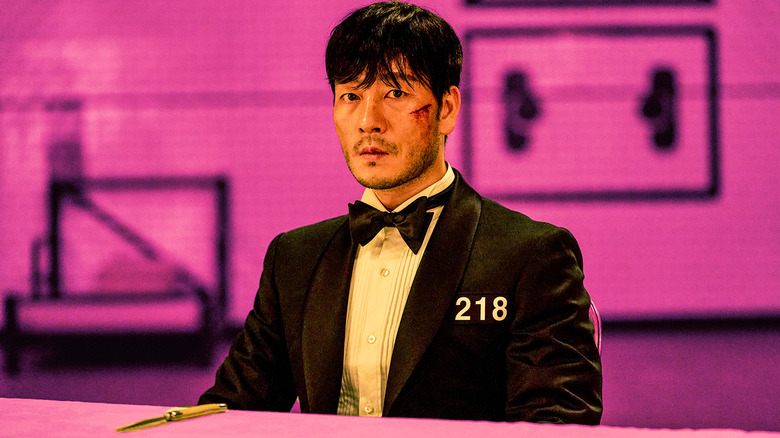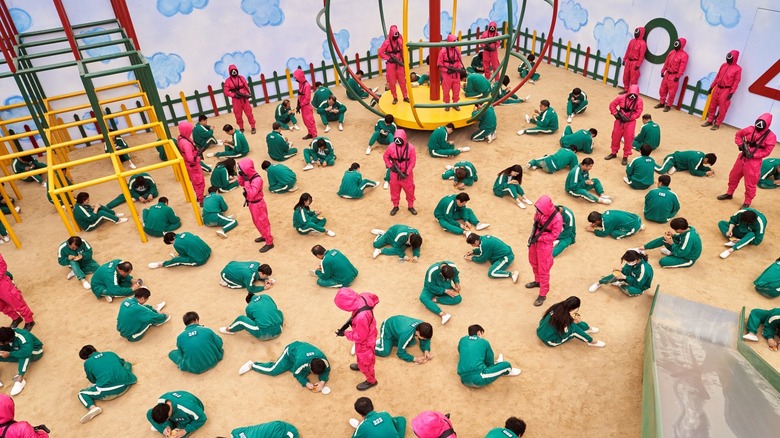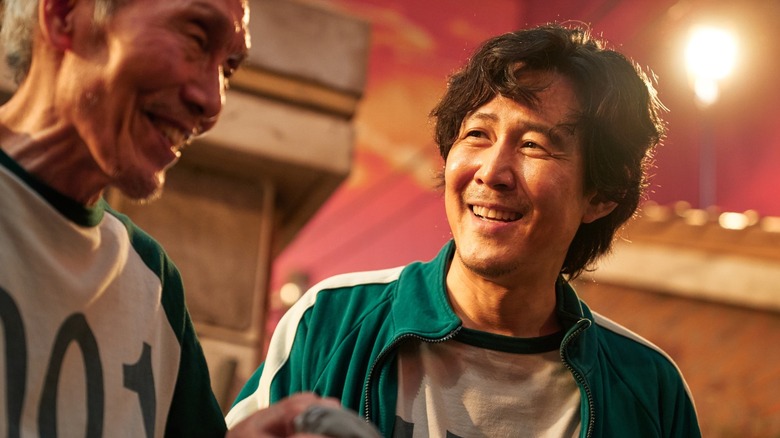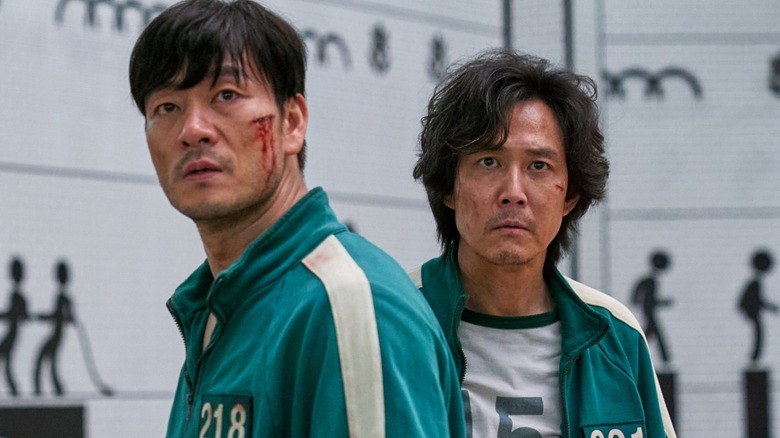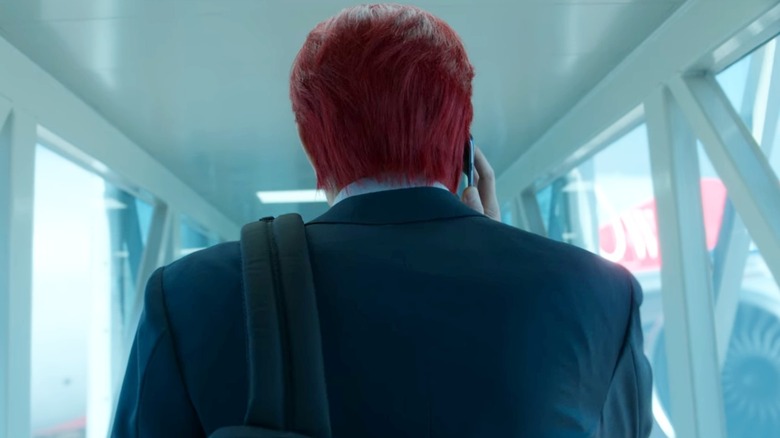Squid Game Season 1 Ending Explained: Don't Hate The Player, Hate The Game
Hwang Dong-hyuk's riveting nine-episode thriller "Squid Game" has a captive audience. In the wake of its Netflix release, the series has become the #1 show on the streaming service across 90 countries as viewers around the world tune in to watch a game with stakes that transcend language barriers: Money and death.
Lee Jung-jae stars as "Player 456," known in his day-to-day life as Seong Gi-hun. A chronic gambling addiction has left Gi-hun broke, divorced from his wife, living back home with his elderly mother, and about to lose contact with his daughter as her mother and step-father plan a move to the United States. Yet everything that makes Gi-hun an outcast in society makes him a perfect candidate for a top secret tournament, in which people in dire financial straits play a series of scaled-up children's games in order to compete for a total prize pot of 45.6 billion won ($39 million).
Is there a catch? Of course there is. If you lose any of the six games in the tournament, you die. Hundreds of players are slaughtered in the first round ("Red Light, Green Light"), yet when given the option to drop out and return to their normal lives, almost all of the surviving players ultimately choose to continue on to the next round.
It's a distinction that sets "Squid Game" apart from other obvious points of pop culture comparison, like "Battle Royale" and "The Hunger Games." The players may protest the sadism of the games and beg for mercy while being guarded by faceless drones carrying guns, but the torture they're being subjected to is one that they could have walked away from.
In the sixth and final round, only two players remain: Gi-hun, and his childhood friend Sang-woo (Park Hae-soo), who is the pride of their hometown but is secretly facing prison time for losing billions of won in company money by gambling on a much larger scale. Trapped between the stick of their crippling debt and the carrot of enough wealth to solve all of their problems, Gi-hun and Sang-woo play together for the last time. Here's a breakdown of "Squid Game" season 1's ending and how it bookends the themes of this thought-provoking South Korean thriller.
People As A Commodity
"Squid Game" constantly reinforces the idea that Gi-hun and the other players in the game are seen as objects, not as people. The mysterious organization running the game uses the same black box and pink ribbon design for its coffins as it does for its gifts. When Gi-hun is first seduced by the offer of a game of ddakji, the Salesman (Gong Yoo) offers to let him pay with his body in lieu of money — by enduring a slap in the face for every round he loses.
This simple game is a test of the subject's willingness to let themselves be objectified — motivated not only by the potential prize, but by the thrill of the game. There's plenty of overt class commentary in "Squid Game," particularly in the final rounds as the VIPs use human servants as furniture while watching from a safe distance as the desperate players tear each other apart. Yet the dynamic is more complex than "rich vs. poor." The players range in status from the truly penniless (Gi-hun) to the ostensibly wealthy (Sang-woo). Then there are rougher, street-smart characters like Deok-su (Heo Sung-tae) and Mi-nyeo (Kim Joo-ryoung), who might not be as desperate for the cash as others, but have no limits to what they'll do in order to get it.
"Squid Game" gradually blurs the lines between the players, the soldiers, the VIPs, and the mysterious Front Man. At first they appear to be two groups: the sheep and the shepherds; the puppets and the puppet-masters; the haves and the have-nots. But when Detective Hwang Jun-ho (Wi Ha-joon) infiltrates the island where the games are held and disguises himself as a soldier, he finds them living in conditions almost as rigidly-controlled as those of the players. And when he finally finds his missing brother, In-ho (Lee Byung-hun), he finds him behind the mask of the Front Man. In-ho previously emerged from a round of games as the victor and, when given the financial freedom to do anything, he apparently chose to return to the arena and start running the games.
Even the VIPs are gambling addicts — so numbed by the cushion of their wealth that they bet eye-watering sums of money on games of life and death just to feel a jolt of genuine excitement. And for one of the VIPs, simply being a spectator wasn't enough.
The Host
"Squid Game" is an emotionally grueling series, but perhaps no episode is more devastating than episode 6, "Gganbu." The fourth round — in which contestants play simple games of marbles in pairs — at first seems rather anticlimactic after the grand scale of previous trials like "Red Light, Green Light" and "Tug-of-War." But after being told to find a "partner," the players are horrified to learn that they'll be competing against each other, and only one person from each pair can survive.
It's a set-up that knocks all the characters off-balance. Stoic, independent loner Sae-byeok (Jung Ho-yeon) is paired with the similarly inscrutable Ji-yeong (Lee Yoo-mi) when no one else wants a girl on their "team," and the two find themselves finally able to let their guard down — safe in the knowledge that by the end of the round either they'll be dead, or the person they just spilled their secrets to will be. Deok-su finds himself in a situation where his strength and fighting skills are useless, since violence is not permitted. And Sang-woo is forced to get his hands dirty when his partner, Ali (Anupam Tripathi), gets close to winning the game.
Of all the main characters, Gi-hun is tested the hardest by the game of marbles. Up to this point, Gi-hun has been established as a likable guy who does far more harm to himself than he does to others. In the first episode, he stops to give a fish tail to a hungry street cat. He encourages the players to work together as a team, and he feels responsible for the frail, elderly Player 001 (O Yeong-su). But after taking pity on OO1 and choosing him as a partner in lieu of someone younger and more capable, Gi-hun faces a horrible choice. He can either let Player 001 win the game fairly and live, even though the tumor in his brain will kill him soon enough. Or he can take advantage of 001's dementia and cheat in order to win the game, effectively murdering the old man in order to save himself. He makes the latter choice.
The agony of "Gganbu" makes the twist ending of "Squid Game" season 1 all the more painful. A year after winning the game, Gi-hun gets a note from his "gganbu" inviting him to a high-rise building. There he discovers Player 001 (whose real name is Oh Il-nam), still alive but now close to death from his brain tumor. Il-nam reveals that he is an extremely wealthy man, but his wealth had robbed him of the ability to feel joy — and his business clients (the VIPs) felt the same way. Yearning to regain the joy and fun of his distant youth, Il-nam recreated games from his childhood and put himself in them alongside hundreds of other players — not players who were forced to participate, but players who chose to. And ultimately, with his "gganbu" at his side, Il-nam dies happy.
Sang-woo's Final Game
Sang-woo enters the games with a mercenary attitude: He's determined to win, and he's willing to do whatever it takes. But though "Squid Game" builds Sang-woo up as a villain through irredeemable acts (stealing Ali's marbles, and murdering a defenseless Sae-byeok), his motivations are more complex than simple self-interest.
Gi-hun is delighted to see a familiar face when he arrives at the games, but Sang-woo — who didn't expect any of the other players to be people from his "real life" — acts cold and distant in response. And as the games go on, Gi-hun's persistence in telling all the other players about Sang-woo's accomplishments and his revered status in their hometown only serve to harden Sang-woo's resolve. Because ultimately he is playing the game not for himself, but for his mother.
When Sang-woo returns to the outside world in the aftermath of "Red Light, Green Light," he observes his mother from a distance but doesn't approach her. Not only is his mother financially tangled up in his current crisis, since he used her store as collateral, she also derives both social status and personal comfort from being the mother of the town's great success story: Cho Sang-woo, who studied at Seoul National University and is now an important businessman. Sang-woo believes that he cannot face his mother and tell her the truth without greatly hurting her, and that the only way he can fix things is by being the only player to leave the games alive.
The key to Sang-woo's ruthlessness is also the key to his surrender. When he is defeated and left bleeding on the ground in the final game, Sang-woo is given one last chance to walk away from the games with no prize except for his life. Instead, he chooses to kill himself and let Gi-hun win — and before he dies, his final words are about his mother. He can no longer win the game, which (in his mind) means that he can never return to his mother without shattering the image of the son that she is so proud of. He's worse off now than when he started: guilty not only of financial mismanagement, but of murder. Having gambled and lost what little he had left, Sang-woo chooses death.
The Aftermath
After Gi-hun is unceremoniously dumped back on the street with a boatload of trauma and 45.6 billion won in his bank account, "Squid Game" jumps forward a year later to find him living exactly as he did before — except worse. The money has been gathering dust in a savings account, untouched. It's little wonder that Gi-hun wants nothing to do with it; he already chose to walk away from the money during the final game, and Sang-woo's violent suicide is the only reason it's now in his possession. What's more, while Gi-hun was busy chasing his fortune, his mother died alone in their apartment.
Gi-hun's refusal to spend the money might be frustrating for viewers who just want to see the protagonist they've been rooting for become a winner in the real world — pay off his gambling debts, win custody of his daughter, hire a therapist — but the overriding theme of "Squid Game" is that money is neither the cause of nor the solution to his problems. Sang-woo was wealthy, yet he ended up in the exact same place that Gi-hun did. Gi-hun also had money at the start of the series thanks to a lucky bet, but lost it all. With 10,000 won left in his pocket he chose to gamble it on a claw game in an effort to win his daughter a present, instead of just buying her one. And if he hadn't lost the rest of the money, there's no doubt that he would have gambled that away as well.
To reiterate an earlier point, "Squid Game" is less about class divides than about what unites people across all classes: A yearning for the thrill of the game, and the chance to win. The Salesman could have simply handed Gi-hun a wad of cash and told him there was more where that came from, but the real bait was the ddakji game, not the money. When Gi-hun finally scored a win, he had forgotten about the money altogether and was simply excited for a chance to slap the Salesman back.
This comes full circle at the end of "Squid Game," when Gi-hun has everything he wanted at the start: He has money in his bank account, a smart suit, a striking new hair color, and a plane ticket to go and see his daughter. But as he's about to board the plane, he instead calls the number to join the next round of games. He tells the voice at the other end that he's a person, not a racehorse, and claims that he's returning in order to unmask the people running the game.
Perhaps that's true. Perhaps "Squid Game" season 2 will see Gi-hun triumphantly dismantling the games from the inside. Or perhaps he's simply telling himself whatever lie is necessary to justify giving in to his sickness all over again.
